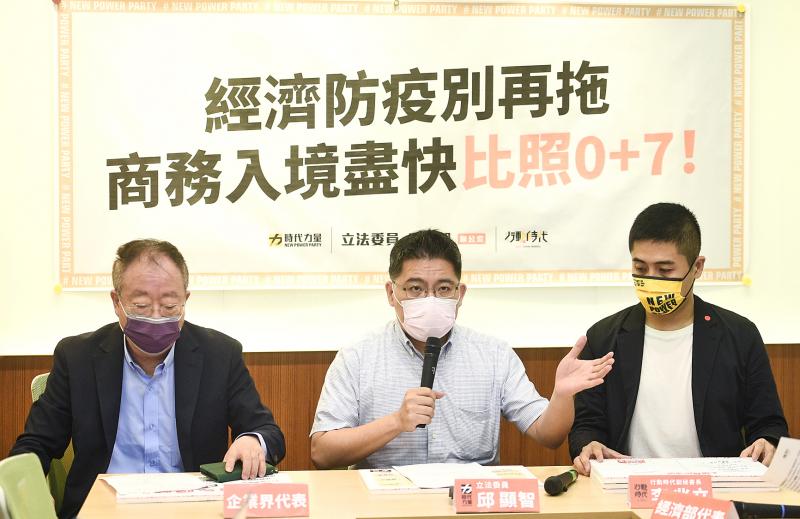Business travelers should not have to quarantine for seven days after an overseas trip as the nation has been easing quarantine requirements for people infected with COVID-19, New Power Party (NPP) Legislator Chiu Hsien-chih (邱顯智) said yesterday.
Business travelers are presently required to quarantine for seven days and practice self-health management for another seven days, the same as for other arrivals.
The NPP has proposed that business travelers should only be required to practice self-health management for seven days.

Photo: Peter Lo, Taipei Times
The party yesterday set up a hotline for business travelers to voice what they need.
Chiu invited an entrepreneur surnamed Lee (李) to the news conference to share his experience.
“My firm did not get a questionnaire from the Bureau of Foreign Trade asking for our opinion on the proposed quarantine change until Tuesday,” Lee said. “Prior to Tuesday, there was no formal communication of any kind.”
Lee said he talked to a business association many times about the issue, but was told that he could not win a fight with the government.
Lee said he found it outrageous that officials would implement a major change in quarantine policy without asking businesspeople first.
“Nobody wants to contract COVID-19, but we have to travel for business,” he said.
“The government treats business travelers returning from overseas like they have contracted COVID-19 and requires them to quarantine, which is an outright humiliation to entrepreneurs,” Lee added.
The least the government could do is let entrepreneurs voice their opinion, he said.
“I traveled overseas 24 times in 2019. Over the past two years, I have complied with the government policy, reducing my overseas trips to eight, which meant that I quarantined for a total of two months. It messed up my life and my job,” he said.
The Ministry of Economic Affairs is “clueless” about most businesspeople’s complaints, Chiu said, adding that Minister of Health and Welfare Chen Shih-chung (陳時中) did not discuss easing the quarantine requirements for business travelers with the ministry until Saturday last week.
“This shows that the government has not been regularly reviewing its policy on business travel and updating it accordingly,” Chiu said. “The border controls are presently the same for all arrivals. There is no difference between border controls for Taiwanese and foreigners — it’s not fair.”
The NPP recommended that the government exempt “low-risk, high-demand inbound travelers” from the quarantine requirements, including Taiwanese living abroad and businesspeople traveling for Taiwanese companies.

POSITIVE DEVELOPMENT: Japan and the US are expected to hold in-depth discussions on Taiwan-related issues during the meeting next month, Japanese sources said The holding of a Japan-US leaders’ meeting ahead of US President Donald Trump’s visit to China is positive news for Taiwan, former Japan-Taiwan Exchange Association representative Hiroyasu Izumi said yesterday. After the Liberal Democratic Party’s landslide victory in Japan’s House of Representatives election, Japanese Prime Minister Sanae Takaichi is scheduled to visit the US next month, where she is to meet with Trump ahead of the US president’s planned visit to China from March 31 to April 2 for a meeting with Chinese President Xi Jinping (習近平). Japan and the US are expected to hold in-depth discussions on Taiwan-related issues during the

‘LIKE-MINDED PARTNER’: Tako van Popta said it would be inappropriate to delay signing the deal with Taiwan because of China, adding he would promote the issue Canadian senators have stressed Taiwan’s importance for international trade and expressed enthusiasm for ensuring the Taiwan-Canada trade cooperation framework agreement is implemented this year. Representative to Canada Harry Tseng (曾厚仁) in an interview with the Central News Agency (CNA) said he was increasingly uneasy about Ottawa’s delays in signing the agreement, especially as Ottawa has warmed toward Beijing. There are “no negotiations left. Not only [is it] initialed, we have three versions of the text ready: English, French and Mandarin,” Tseng said. “That tells you how close we are to the final signature.” Tseng said that he hoped Canadian Prime Minister Mark Carney

President William Lai (賴清德) yesterday bestowed one of Taiwan’s highest honors on Saint Vincent and the Grenadines (SVG) Ambassador Andrea Clare Bowman in recognition of her contributions to bilateral ties. “By conferring the Order of Brilliant Star with Grand Cordon on Ambassador Bowman today, I want to sincerely thank her, on behalf of the Taiwanese people, for her outstanding contribution to deepening diplomatic ties between Taiwan and SVG,” Lai said at a ceremony held at the Presidential Office in Taipei. He noted that Bowman became SVG’s first ambassador to Taiwan in 2019 and

A man walks past elementary school artworks at the Taipei Lantern Festival in Ximen District yesterday, the first day of the event. The festival is to run from 5pm to 10pm through March 15.